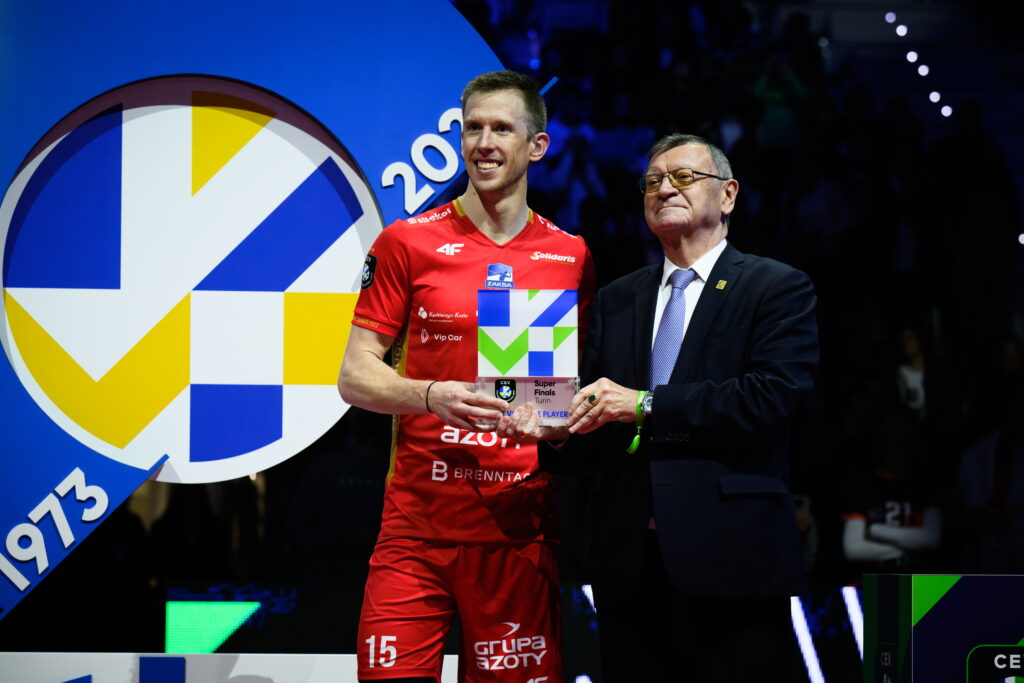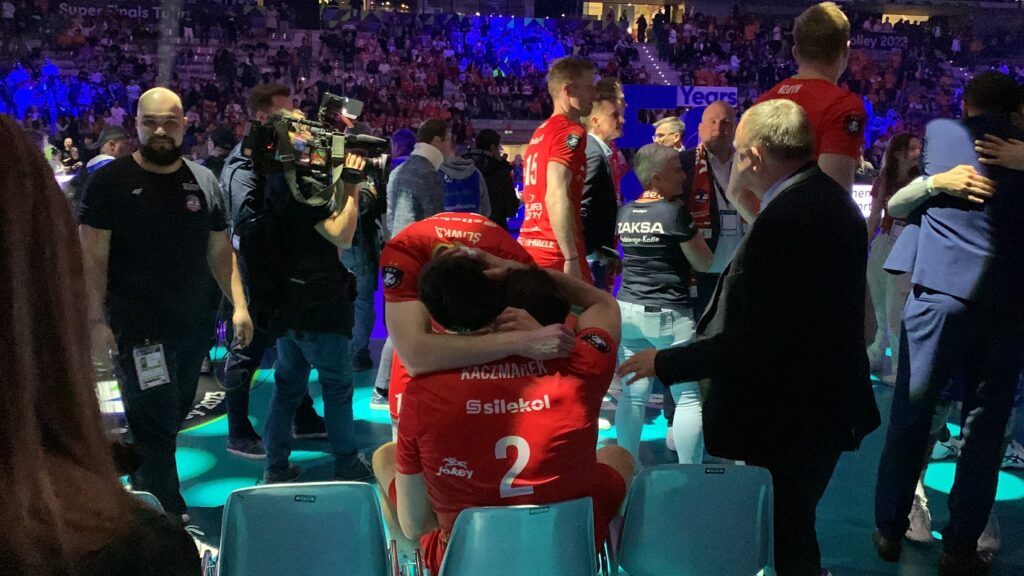Men's Final
Sakza (Poland) - Jastrzebski Wengier (Poland, hereafter JW)
3-2 (26-28, 25-22, 25-14, 28-30, 15-12)
The men's final, which was the same match as this season's Polish league final, was a fierce battle that lasted for about two and a half hours.
In the first set, JW, the Polish league champions, took the lead by a narrow margin of 26-28 with attacks led by opposite hitter Boyer (France). However, in the second set, Zakza took back the lead 25-22 with points scored mainly by outside hitter Bednos.
In the following third set, Zakusa continued their momentum, scoring eight block points in this set alone, giving JW no chance to counterattack and winning 25-14.
It seemed like Zakusa would win the match, but with outside hitter Fornal stepping up, JW narrowly won the fourth set 28-30, forcing the match into a tiebreak.
In the fifth set, despite their serve reception being disrupted throughout the match, Zakusa's three side attackers continued to score with a high attack success rate, and they won the set 15-12, defeating JW 3-2.
Final standings
Winner: Zaksa Kedzierzynkozyle (Poland, 3rd time in a row)
Runner-up: Jastrzebski Wengier (Poland)
3rd place: Perugia (Italy), Halkbank Ankara (Türkiye)
MVP: David Smith (USA)
(Finals results: 13 points (2 serves, 4 blocks), attack success rate 78%)

Thoughts etc.
The women's match was the Turkish Derby, and the men's match was the Polish Derby, but the venue was Italy. Although Vakfbank did have Egon, a superstar in the Italian women's volleyball world, I was honestly worried about whether we would be able to attract enough spectators.
But this was an unnecessary worry. The place was almost full, packed all the way to the top.
And you can hear Polish everywhere (laughs).
It takes two hours by plane from Poland to Italy, and tickets are as cheap as 3,000 yen with low-cost carriers. Both countries are Schengen member states and there are no passport checks, so Poles can travel to Italy with less hassle than traveling domestically in Japan.
Of course, many Polish fans were wearing uniforms or supporter T-shirts of both clubs, but there were also quite a few people wearing Polish national team uniforms (such as Kubiak), and there were a certain number of people who were not just fans of one of the clubs but just fans of Polish volleyball.
Türkiye is also popular, especially women's volleyball, but perhaps because travel there is not as easy as in Poland, the numbers of people who appeared to be local fans were sparse.
Even so, when the match started, each spectator cheered for each team and got very excited. However, the atmosphere of the men's final really felt like it was being held in Poland, which scared me. I thought, "Is this really Italy?" (laughs).
As for the game content, first of all, the women's final was a battle between the two opposites. Egon, in particular, was a monster, hitting 57 shots and scoring 37 of them. I know she was in top form and the balls were gathering, but as a viewer, it felt like watching a men's V-League match from a long time ago, and it was not very interesting.
However, it seems that the trend in modern women's volleyball is to concentrate the ball on the super opposite. This is the opposite phenomenon to the male opposite, who is becoming an all-rounder who also receives serves, and this, combined with the fact that I am no longer interested in women's volleyball (laughs).
By the way, the women's final was a Turkish derby, but it was neither of these teams that won the Turkish league this season, Fenerbahce, and I think it was a season that highlighted the high level of Turkish clubs.
The men's final was a Polish derby. As a resident of Poland, it was a showdown between two teams I'm familiar with. These two teams had met in the finals for every domestic title this season, with JW winning the Super Cup and league title and Saksa winning the Polish Cup before this match.
Therefore, based on the results, it was a situation where either team could have won, but personally I thought Zakusa would win.
Zakusa not only has overwhelming experience as a club that has won the tournament two years in a row, but has also defeated two strong Italian teams, Trento (Italy) in the quarterfinals and Perugia (Italy) in the semifinals. On the other hand, JW has advanced relatively easily without having played against an Italian club.
Looking back at the history of the men's Champions League, most of the winners have been clubs from Italy or Russia (the Soviet Union). Currently, Russian clubs cannot participate due to the war, but there is no way that a European champion can win without beating both Italy and Russia. In fact, I don't want such a club to win (laughs).
In fact, I think this fact had some effect on the players' mentality. In fact, although it was a small margin, Zaksa, who was able to perform better on this big stage, won the championship brilliantly. In particular, Zaksa's Silivka, who was in the final for the third consecutive year, and Smith, who won the MVP, performed close to their best throughout the season (although Kaczmarek, who was also in the final for the third time, was a bit iffy (lol)).

However, the men's final match started at 8:30pm and finished at 11pm. Preparations and the award ceremony went past midnight. This means that even people living nearby will be unable to get home by public transport that day, so I personally find it hard to understand, but league matches usually start at 8:30pm or close to 9pm, so maybe this is normal in Europe... (laughs).
Ishikawa Yuki's Milan finished 4th in the league this season and unfortunately missed out on a place in next season's Champions League. However, it may not be long before a Japanese player takes to the stage of the European Champions League final. If that happens, it would be really great.
Photo: CEV, author
